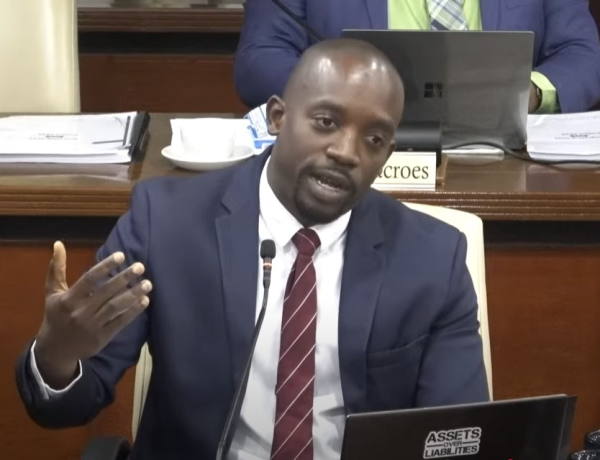 PHILIPSBURG:--- During the parliamentary debate on the second draft of the 2025 budget on Thursday evening, Member of Parliament Ardwell Irion raised several critical issues regarding the withholding of dividend tax, its timing, implementation, and broad implications for both local businesses and foreign investors. His concerns were framed around questions of economic fairness, the readiness of administrative systems, and transparency in decision-making.
PHILIPSBURG:--- During the parliamentary debate on the second draft of the 2025 budget on Thursday evening, Member of Parliament Ardwell Irion raised several critical issues regarding the withholding of dividend tax, its timing, implementation, and broad implications for both local businesses and foreign investors. His concerns were framed around questions of economic fairness, the readiness of administrative systems, and transparency in decision-making.
Timing and Implementation Criticized
MP Irion voiced strong opposition to the timing of the dividend withholding tax, arguing that its sudden introduction left businesses and Parliament blindsided. He emphasized that critical pre-implementation discussions with Parliament were neglected, despite calls from the Committee of Finance to engage lawmakers in exploring tax reforms.
The MP questioned the rationale behind announcing and implementing the tax beginning January 1, 2025, without aligning it with Saint Martin’s current economic realities. "Even though this law was approved 25 years ago, our realities today are not the same," he stated, advocating for broader Parliamentary oversight in such pivotal fiscal decisions.
Regional Comparisons and Economic Concerns
MP Irion drew comparisons to neighboring regions, such as Bonaire and Curaçao, to highlight disparities in tax structures and their implications. He pointed out that, unlike Saint Martin, Bonaire does not impose profit tax on businesses, making any comparison unsound. He also noted that Curaçao offers zero tax on dividends for non-residents, further exposing the competitive disadvantage imposed by Saint Martin's high tax rates.
Saint Martin already has one of the highest corporate tax rates in the region at 34.5%. When combined with the 10% dividend withholding tax, MP Irion argued that such policies make the island one of the least attractive for investment. He urged the government to explain how implementing the highest combined tax rate in the region would encourage business growth.
Lack of Transparency and Public Awareness
Transparency was a recurring theme in MP Irion’s address. He criticized the government for failing to launch a public awareness campaign to inform stakeholders about the new tax. He questioned whether adequate steps had been taken to ensure the public and business community were sufficiently prepared. He urged clarity on what budget had been allocated for such an effort.
He also underscored the importance of Parliament being provided complete and accurate documentation relating to the tax’s implementation plan, stating, “Transparency is not a courtesy, it’s a constitutional duty.”
Readiness of IT and Administrative Systems
Another critical issue raised by MP Irion was the government’s readiness to administer the tax effectively. He questioned whether the existing IT infrastructure was capable of handling the implementation and monitoring of dividend withholding tax compliance. He specifically referenced the need for an updated portal for business owners to submit tax-related information. He inquired whether the new IT systems referenced by the government had been adequately funded and planned.
Concerns about cash flow disruptions and refund delays for businesses were also raised on the floor, with MP Irion seeking assurances that the necessary administrative systems were in place to manage the tax without causing undue hardship.
Implications for Local and Foreign Businesses
MP Irion disputed the government's claim that the new tax would primarily affect foreign shareholders. He argued that local businesses would inevitably bear part of the burden, stressing that the law’s language does not differentiate between local and foreign stakeholders. He also sought input from the Minister of TIAT on whether the tax would benefit or harm micro, small, and medium enterprises—a sector he described as fundamental to the island's economy.
The MP called for more comprehensive tax reforms that address the island's unique challenges, including reinvestment incentives and exemptions for businesses that contribute to local economic growth.
Final Remarks
MP Ardwell Irion’s address was both a critique of the withholding of dividend tax and a broader call for fiscal responsibility, transparency, and fairness in governance. From questions about the tax’s potential financial burdens to its long-term implications for investment and local enterprises, MP Irion made his case for a reevaluation of the policy. He concluded by emphasizing the critical need for better planning and public engagement, urging the government to move beyond "champagne dreams on a bare budget" to implement solutions that benefit all of Saint Martin.
This debate highlighted the growing concerns among lawmakers about the impact of fiscal policy on economic recovery and competitiveness. With the budget still under review, MP Irion's points may influence future discussions on how Saint Martin approaches tax reforms and economic development.